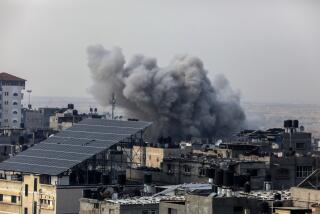Bush Too Patient for Public
WASHINGTON — On the face of it, things look good for President Bush. His job-approval ratings are stuck near 90%. When people are asked to judge the military action in Afghanistan that he is overseeing, public support hovers in the high 80s. Even Rosie O’Donnell is on the reservation these days. A closer inspection of the numbers, however, suggests that a few weeks from now, Bush’s cautious, incremental approach to the war on terrorism may look a little thin.
The president’s rosy reviews begin to erode when questions turn to military specifics. Then the public seems to be far ahead of Bush. In a CNN/Gallup/USA Today poll released last week, 66% of the respondents said they favored “sending large numbers of ground troops into combat in Afghanistan.” In the same poll, though 88% said they “approved of U.S. military action” abroad, 52% were only “somewhat satisfied” with the progress of the war. Another 18% were “not too satisfied” or “not at all satisfied.”
Another CNN/Gallup/USA Today poll, taken at the end of October, showed 80% favoring the use of ground troops in Afghanistan, and 50% of them wanted the United States to “take over areas” in Afghanistan for an indefinite period of time. Eighty-five percent viewed civilian casualties as “unavoidable.”
In another recent poll, this one done by the New York Times and CBS News, 60% of the respondents anticipated the war on terrorism lasting longer than one or two years; 64% expected the attacks on Afghanistan to go on several months longer. Sixty-one percent said that the war would be worth it even if “several thousand American troops lose their lives in Afghanistan.” Perhaps most illustrative of American resolve is this figure: 83% are prepared for the war on terrorism to expand outside Afghanistan.
These numbers portray a country serious about a real war--not a rhetorical one--on terrorism. They stand in marked contrast to the president’s pinprick military approach to dislodging the Taliban. So, why are people still supporting him?
Part of the answer is patriotism. In times of crisis, Americans are slow to criticize their leaders. Another part is that the White House has skillfully removed Bush from the visible day-to-day running of the war. The president often talks about “the evil one” and the need for the war on terrorism, but he rarely speaks on specifics of either the military operations in Afghanistan or security issues at home. Only sparingly has he talked about the FBI’s investigations of the anthrax scare. Which probably explains why even though 50% of Americans think the government is not “telling people everything they need to know about the anthrax attacks,” no one is blaming Bush for it.
But Bush’s poll numbers may not be able to withstand his administration’s accumulating mistakes. Tommy G. Thompson has been something of a keystone cop over at the Department of Health and Human Services, especially after suggesting that the first victim of inhalation anthrax got it while fishing. Then he downplayed the danger of the anthrax-laced letter sent to Sen. Tom Daschle’s office. Two postal workers may well have died as a result of exposure to the letter. Tom Ridge increasingly looks like window-dressing as our Homeland Security chief. As one helpful White House official explained, “We want to brand Tom Ridge. When people see him, we want them to think, ‘My babies are safe.”’
The State Department, meanwhile, continues to publicly humiliate Israel, one of America’s most reliable allies in its war on terrorism. On Oct. 22, State Department spokesman Philip T. Reeker read a letter saying, “We deeply regret and deplore” Israel’s response to the assassination of its cabinet minister. Reeker went on to say that Israel had killed “numerous ... innocent civilians” and its military response had led to a “significant escalation in tension and violence.” The president even went so far as to call for Palestinian statehood. He must have forgotten the video of Palestinians celebrating the Sept. 11 attacks on the World Trade Center and the Pentagon.
The administration has also made a fetish of the welfare of the Afghan people with food drops and pen pals and dollar bills for Afghan children. These initiatives were meant as ricochet pander: The administration didn’t have any hope of winning over Muslim holy warriors; instead, it wanted to convince Americans that we aren’t being bullies in Afghanistan. The president apparently doesn’t trust polls showing that a majority of Americans don’t seem to care much about our “image” when fighting terrorists abroad.
Finally, and perhaps most disturbing, was the spate of stories citing “sources in the administration” assuring us that the anthrax attacks were almost certainly not the work of Islamic fundamentalists. Sure, investigators remain publicly mystified about the source of the anthrax, and the administration knows more than the rest of us, but this spin doesn’t pass the smell test.
None of which is to say that Bush can’t recover and perform brilliantly. The hallmark of his political career has been his ability to adapt. He was given a pass to do whatever his conscience dictated in the days after Sept. 11, and his conscience opted for coalitions, airstrikes, pen pals and a couple of “daisy cutter” bombs.
As winter settles into Afghanistan, and the Taliban proclaim victory for having stood up to the United States longer than anyone expected, the president will see his near-unanimous public support eroding. He has called repeatedly for patience, and the polls show that Americans are prepared to be very, very patient in a protracted war on terrorism. But they will not long accept a call for patience as a means to avoid action.
More to Read
Get the L.A. Times Politics newsletter
Deeply reported insights into legislation, politics and policy from Sacramento, Washington and beyond. In your inbox three times per week.
You may occasionally receive promotional content from the Los Angeles Times.









